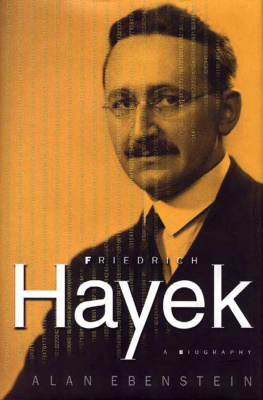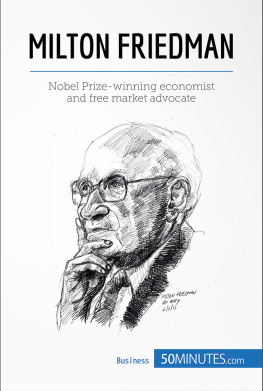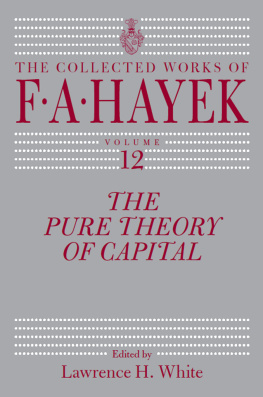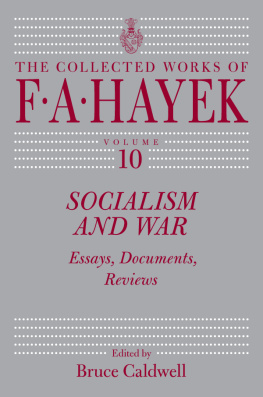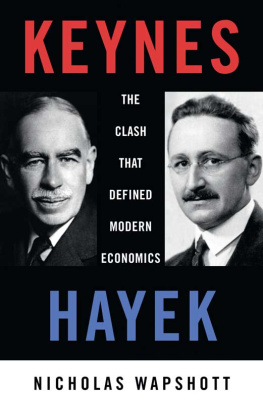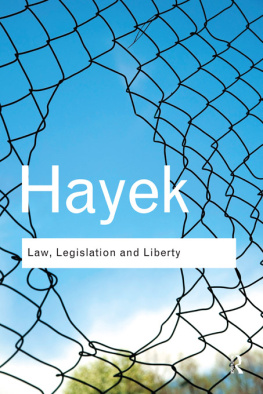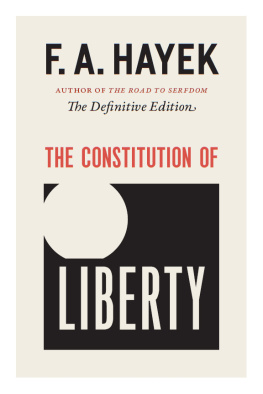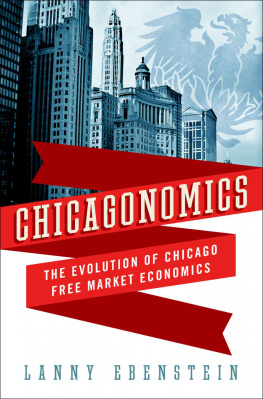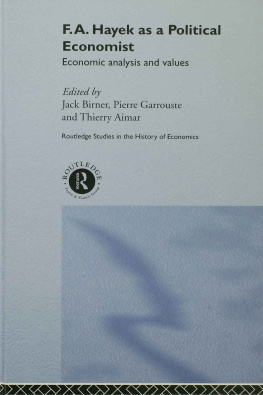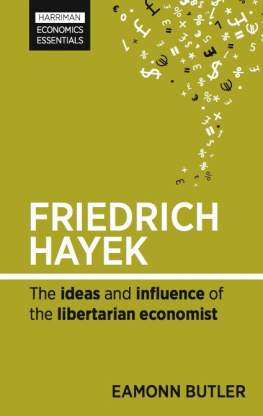
The author and publisher have provided this e-book to you for your personal use only. You may not make this e-book publicly available in any way. Copyright infringement is against the law. If you believe the copy of this e-book you are reading infringes on the authors copyright, please notify the publisher at: us.macmillanusa.com/piracy.
Contents
That interdependence of all men, which is now in everybodys mouth and which tends to make all mankind One World, not only is the effect of the market order but could not have been brought about by any other means.
Friedrich Hayek,
Law, Legislation and Liberty
The purpose of this work is to trace the intellectual life of Friedrich Hayek. Hayek was the greatest philosopher of liberty during the twentieth century. His contributions to political theory and philosophical economics are immense. The most visible sign of Hayeks importance is the cottage industry of books appearing about him in various languages throughout the world. Intellectual biography may provide greater context for understanding a writers work. Particularly in the social sciences, the terms in which discussions are held are often, perhaps usually, in contemporary parlance. By knowing a thinkers life and times better, one may obtain greater insight into his thought.
Hayeks life was interesting. His residences in Vienna, London, Cambridge, Chicago, and Freiburg provide snapshots of leading centers of academic debate during the twentieth century. His life is most interesting, though, in helping to elucidate his thought. His universality is demonstrated by the broad and deep interest in him.
It is a delightful opportunity to thank the people who helped in the preparation of this book. Hayeks children and daughter-in-lawLarry Hayek, Christine Hayek, and Esca Hayekgenerously answered questions. Larry and Esca put me up for weekend visits to their home on three occasions; their hospitality is among my fondest recollections of this project. Hans Warhanek, the son of Hayeks second wife, answered questions on two occasions. I spoke very briefly over the phone to Helene von Hayek, Hayeks second wife (who died in 1996); and visited their Freiburg apartment.
A number of people agreed to be interviewed. I thank Milton and Rose Friedman, James Buchanan, Ronald Coase, Gary Becker, Edwin Meese, Arthur and Marjorie Seldon, Sir Ernst Gombrich, D. Gale Johnson, Tibor Scitovsky, Ronald Fowler, Lord Desai, Erich Streissler, Peter Rosner, Kurt Faninger, Werner Tschiderer, Reinhold Veit, David Grene, Joseph Cropsey, William Letwin, Charlotte Cubitt, Lord Harris, Manuel Ayau, Christian Gandil, Walter Grinder, Ralph Horwitz, Albert Zlabinger, Harold Dulan, John Kane, W. Allen Wallis, and Fr. Johannes Schasching. I exchanged correspondence with a number of people, including James Vice, Richard Stern, Stanley Heywood, Paul Post, Sal Soraci, Vera Hewitt, Eric Rose, Henry Toch, Harold Noah, P. M. Toms, Theodore Draimin, Peter Kingsford, the late James Meade, David Jickling, the late Julian Simon, and Edward Lowenstern.
This work has benefited by its review in manuscript form by a number of academics and scholars, some of whom knew Hayek. I thank Bettina Bien Greaves, Jim Powell, Mark Skousen, Peter Klein, Richard Ebeling, Sudha Shenoy, Bruce Caldwell, Bill Herms, David Brooks, Chrysostomos Mantzavinos, Todd Breyfogle, and Stephen Kresge. I particularly thank Tom Schrock and three anonymous reviewers for their comments on preliminary manuscripts. Others who read drafts include Joe Atwill, Robert Bakhaus, Rob Ebenstein, Susan Engel, Jim Gazdecki, Geraldine Hawkins, Gary Rhodes, Michael Rose, Art Rupe, Jim Waddingham, and Laura Wilson. No one who reviewed a manuscript draft should, of course, be held accountable for information and interpretations contained here.
Others who assisted in some wayproviding information, encouragement, translation, or other assistanceinclude Eamonn Butler, Glynn Custred, Gordon Baker, Robert Chitester, Lord Dahrendorf, Barry Smith, Stephan Boehm, Brian Crowley, Greg Ransom, David Gordon, Christian Thiele, Eduard Blanc, Max Gammon, Holly Barber, Isaac Kramnick, Sharon Fuller, Mike Westwood, Tom Campbell, Stephen Weatherford, Scott Pinkner, Andy Ebenstein, Robert Haake, Lee Gientke, Lora Soroka, Rebecca DuBey, Walter Mead, William Breit, and the late Henry Spiegel. I also thank the Mont Pelerin Society, University of Chicago Magazine, New York Times Book Review, LSE Magazine, and libraries and special collections at the University of California, Santa Barbara and Los Angeles; the Hoover Institution; the University of Chicago; the London School of Economics and Political Science; Salzburg university; and the University of Vienna. I finally thank Michael Flamini, Alan Bradshaw, Rick Delaney, and Meg Weaver.
I should perhaps mention my background and the process by which this book was written. Friedrich Hayek: A Biography was my main endeavor from December 1993 through December 2000. This included extensive and intensive reading of Hayeks work (published and unpublished), much research, and travel. I am, also, son of a political theorist from Vienna, born eleven years after Hayek, who, like him, went to the London School of Economics after graduating from the University of Vienna, and who taught briefly at the University of Chicago. William Ebenstein, my father, was a leading student of two of Hayeks btes noires, Hans Kelsen and Harold Laski.
A few stylistic notes: I have sometimes compressed quotations in the main text for readability without the use of ellipses; however, no words have been added to quotes without so indicating. Also, where a quotations author is not identified, it may be assumed that it is Hayek. Finally, it is useful to think of the six parts of the book as chapters in his life.
I hope that this book is of use to students of Hayek, classical liberalism, libertarianism, and twentieth century political and economic thought and practice, and the relationship between political and economic thought and practice. This work is a history of Hayeks life and thought, and of the libertarian philosophical surroundings in which he worked and lived.
Alan Ebenstein
December 6, 2000
Santa Barbara, California
T HE B RITISH POLITICAL PHILOSOPHER AND ECONOMIST J OHN S TUART M ILL , the leading liberal thinker of the nineteenth century, wrote in his immortal On Liberty that ages are no more infallible than individualsevery age having held many opinions which subsequent ages have deemed not only false but absurd; and it is as certain that many opinions, now general, will be rejected by future ages, as it is that many, once general, are rejected by the present. What Mill wrote a century and a half ago remains true today. The twentieth century will be remembered in part as a battle between classical socialism and democratic welfare state capitalism to create future societal organization.
The idea that central direction of an economy by government is a more efficient and fair method to create and use productive resources than a free market relying on fluctuating prices, profits, and property is now almost universally discredited. While the extent of classical socialisms hold over the minds of many, as opposed to a relatively few academic writers and teachers, may be questioned in what used to be called the West, there is no question that the economies of the Soviet Union and a score of other nations during the twentieth century were, and in a few places still are, run along classical socialist lines of government ownership and management of all land and capital means of economic production. From the 1930s through the 1980s, Friedrich Hayek challenged the prevailing opinion of many social scientists and others that socialism is a more efficient and just form of economic production than capitalism.
Next page
